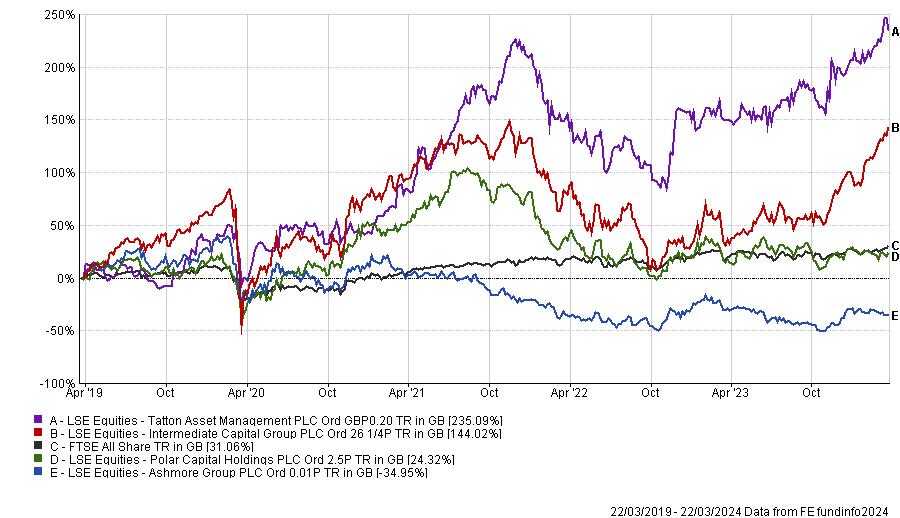Several portfolio managers own stakes in other investment firms, ranging from their direct competitors to wealth managers, platforms and alternative asset specialists.
This gesture of support for their industry may come as a surprise given the well-publicised challenges the UK’s listed active managers are facing. Risk appetite has waned in the past two years as investors sheltered in cash and, although this is starting to change, unpopular asset classes such as UK equities are still seeing outflows. Mid-size active managers are also facing competition from passive strategies, global behemoths and specialist boutiques.
Yet within the financial services industry there are several bright stars, as fund managers reveal below.
Polar Capital
Polar Capital is known for thematic investing and has a well-diversified range of funds, including artificial intelligence, smart energy and healthcare strategies. Some of its funds are attracting inflows, even though overall the firm is still in outflow mode, said Dan Green, manager of the FTF Martin Currie UK Smaller Companies fund. Polar Capital is one of his top 10 holdings.
Green thinks Polar Capital’s fund range is well placed to attract flows when sentiment improves and investors increase their equity allocations.
Until then, it has a strong balance sheet so will be able to continue paying dividends. The current yield is more than 10%, which is rare for a small-cap stock, Green said. “You’re being paid to wait for things to improve.”
Green added Polar Capital is well managed by chief executive Gavin Rochussen, who was previously successful at the helm of JO Hambro Capital Management.
Ashmore Group
Shares in emerging market debt specialist Ashmore Group peaked at £5.70 in February 2020 and are currently at trading around £1.97, a 65% fall over the past four years.
Simon Murphy, manager of the VT Tyndall Unconstrained UK Income fund, started investing in Ashmore in September 2022 at around £2.10.
Investors got spooked by interest rate hikes and became more risk averse, so emerging market debt has been “deeply out of favour” and Ashmore has experienced a lot of outflows, Murphy said.
“It will benefit when emerging markets get back into favour again. It is a bull market operator. When emerging markets do well, the firm does very well, and when emerging markets struggle, it struggles,” he explained.
“We are yet to make any money on this investment, although we have had several substantial dividends during our 18 months of ownership so far. We make investments typically with a three-year time horizon and we are still optimistic that we will generate a good return on this investment during that time.”
Ashmore has about £450m in excess cash on its balance sheet and a dividend yield of more than 7%. The dividends are not fully covered by earnings but Ashmore is committed to using its cash reserves to support dividend payments while it waits for markets to recover, Murphy said. “I think I bought it at the right price. I have a lovely dividend yield while I wait.”
Tatton Asset Management
Businesses that solve problems for their customers are likely to be successful, said Eric Burns, fund manager at Sanford DeLand Asset Management. Tatton Asset Management allows financial advisers and wealth managers to cheaply outsource discretionary fund management, with fees starting from just 15 basis points.
Tatton brought in monthly average inflows of £150m during the year to 30 September 2023, recently hitting its growth target of £15bn in assets, and the business is very scalable, according to Burns. Tatton is his second largest holding, worth 6.7% of the CFP SDL Free Spirit fund.
Given the challenging market conditions in 2022 and 2023, Tatton has “been through a really good stress test over the past few years so it’s really hard to see anything that would derail it. It would take a truly black swan event,” Burns concluded.
Intermediate Capital Group
Intermediate Capital Group started out as a mezzanine debt provider but has branched out into senior debt, equity, real estate, water and other alternatives, said Alexandra Jackson, manager of the Rathbone UK Opportunities fund. “It has done very well at acquiring teams and launching products across the alternatives space.”
Alternative investment managers have fewer competitors and less fee pressure than managers of publicly-traded securities, she added.
The stock is not without its risks. Intermediate Capital Group tends to be quite exposed to credit spreads and general credit stress and when spreads blow out, it tends to underperform, Jackson said.
Murphy has held Intermediate Capital Group since March 2022. “The shares had fallen sharply from a peak of £23.80 in November 2021 to £14.00 (-40%) when I started buying, driven by fears over the impact of rising inflation and interest rates. The share price went on to fall as low as £10.00 in September 2022,” he said.
“They have been recovering very nicely since and are currently at £19.88, which is up 40% from when we initially started buying again and we are still optimistic for further gains in due course.”
This is a strong franchise paying a 5% dividend yield, Murphy added. It has delivered 16.5% compound dividend growth per annum for nine years and has benefitted from demand for alternative investments.
Intermediate Capital Group has transitioned from investing using its own balance sheet to managing closed-ended funds. Fee income from committed and invested capital is a high-rated, “better” source of revenues compared to assets on the balance sheet, he concluded.
Shares in investment firms vs FTSE All Share over 5yrs

Source: FE Analytics




